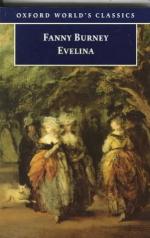|
This section contains 6,370 words (approx. 22 pages at 300 words per page) |

|
SOURCE: “Writing Innocence: Fanny Burney's Evelina,” in Tulsa Studies in Women's Literature, Vol. 9, No. 1, Spring, 1990, pp. 43-57.
In the following essay, Cutting-Gray studies the significance of Evelina's journal and assesses her “calculated innocence and concealed experience.” The critic concludes that Evelina's writing is an effort to portray herself as “an entity,” but this version of herself is in fact a narrowly-defined product of the patriarchal code.
Fanny Burney explained the “original” innocent character of Evelina, protagonist of her famous novel of 1778, to her sister Susan by saying that “she had been brought up in the strictest retirement, that she knew nothing of the world, and only acted from the impulses of Nature.” Quoting from her own preface, she added that the heroine was the “offspring of Nature in her simplest attire.”1 According to the precept of common sense, innocence is a state of unreflective union with a world...
|
This section contains 6,370 words (approx. 22 pages at 300 words per page) |

|


